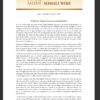Somali piracy, once thought to be subdued, has resurfaced with alarming frequency, raising grave concerns among maritime authorities and merchant vessels alike. In a recent incident, Somali pirates seized control of a fishing boat approximately 69 nautical miles east of the Somalia coast, highlighting the persistent threat posed by piracy in the region.
The Maritime Security Centre – Horn of Africa (MSCHOA) issued an urgent warning following the hijacking, emphasizing the escalating nature of piracy attacks in the area. According to reports, a group of six to seven pirates armed with Kalashnikov rifles launched an assault on the fishing vessel, overpowering its crew and commandeering the ship. The ship’s Automatic Identification System (AIS) tracker is currently inactive, further complicating efforts to track its whereabouts.
Security consultants Neptune P2P Group underscored the concerning trend of piracy resurgence, noting a significant rise in both the frequency and scale of attacks over the past year. The profitability of such operations has emboldened pirate action groups (PAGs), with incidents occurring as far as 1000 nautical miles off the Somali coast.
Recent assessments by EUNAVFOR Atalanta have revealed the presence of multiple PAGs operating in strategic maritime zones, including areas around Socotra Island. Last week, a product tanker came under attack, prompting a fierce exchange of gunfire between the vessel’s security personnel and the pirates. The timely intervention of the Spanish frigate Canarias led to the apprehension of the pirates, who are now being transferred to the Seychelles for prosecution under legal agreements governing piracy in the region.
The resurgence of Somali piracy poses a significant threat to global maritime security, with statistics revealing a troubling uptick in successful hijackings since November 2023. Atalanta records indicate a total of 31 piracy-related incidents as of April, with the recent hijacking adding to the growing tally of maritime disruptions.
The implications of these developments extend beyond immediate security concerns, impacting vital maritime trade routes and necessitating enhanced collaboration among international stakeholders to combat piracy effectively. Heightened vigilance, robust security measures, and coordinated naval patrols are essential to mitigate the risk posed by Somali piracy and safeguard the safety of seafarers and vessels navigating these volatile waters.
As maritime authorities continue to grapple with the resurgence of piracy off the Somali coast, the need for proactive measures and sustained international cooperation has never been more urgent. Only through collective efforts can we effectively stem the tide of piracy and preserve the integrity of global maritime trade.













RTsSoNAr